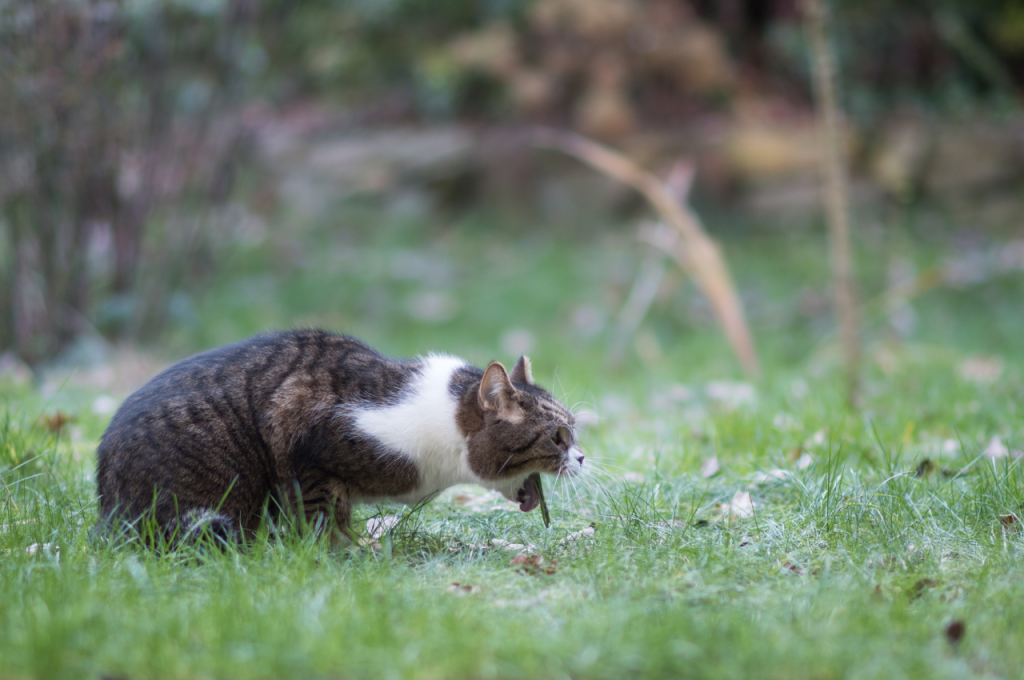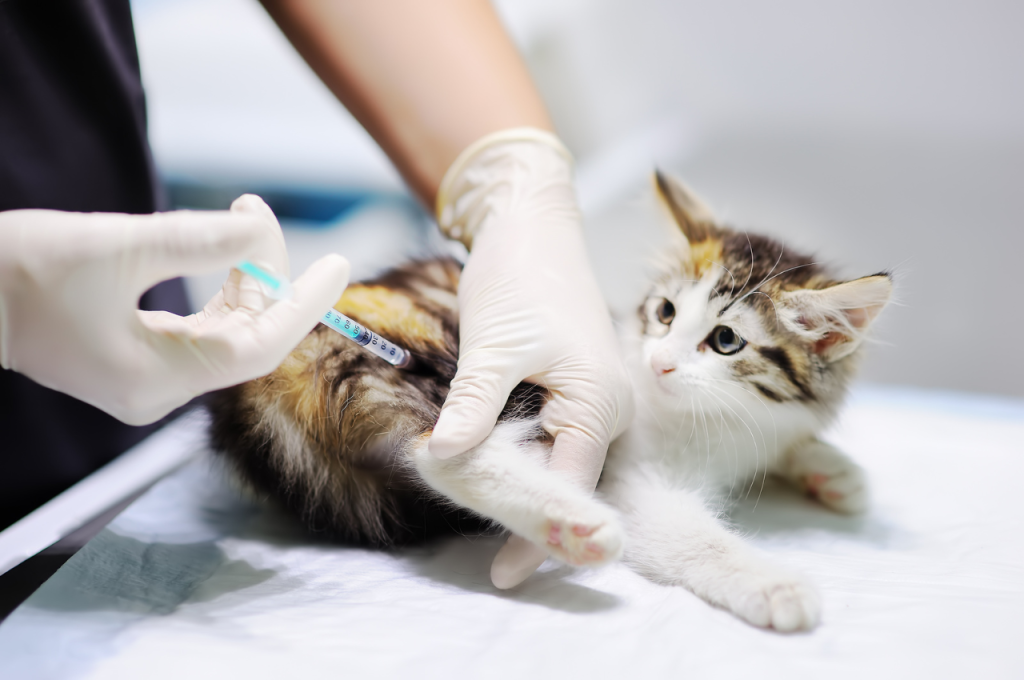To know if your cat has worms, look for symptoms like vomiting, diarrhea, weight loss, and visible worms in their feces. Additionally, check for a swollen belly and a dull coat.
Regular deworming and vet check-ups are crucial for your cat’s health. Ignoring signs of worms can lead to serious health issues. It’s important to seek veterinary advice if you suspect your cat has worms. By staying vigilant and proactive, you can ensure your feline friend stays healthy and worm-free. Remember, prevention is key when it comes to protecting your pet from parasites.
Early Signs Your Cat Might Have Worms
If your cat is showing symptoms like vomiting, diarrhea, weight loss, or a distended abdomen, it might have worms. Additionally, if you notice visible worms in the feces or around the cat’s rear end, it’s a clear sign of a worm infestation. Regular deworming and vet check-ups can help keep your feline friend healthy.

If you’re a cat owner, you know how important it is to keep an eye on your furry friend’s health. One common problem that cats face is a worm infestation. Worms can cause serious health issues for your cat, so it’s important to catch the problem early. Here are some early signs that your cat might have worms.
Weight Loss
If your cat has a sudden weight loss despite eating regularly, it might be a sign of a worm infestation. Worms absorb the nutrients from the food your cat eats, leaving your cat malnourished. If you notice that your cat is losing weight rapidly, it’s important to take them to the vet for a check-up.
Bloated Belly
A bloated belly is another sign that your cat might have worms. Some worms, such as roundworms, can cause a distended belly in cats. If your cat’s belly looks swollen or bloated, it’s important to get them to the vet as soon as possible. A bloated belly can be a sign of other health issues as well, so it’s best to get it checked out.
Changes in Appetite
If your cat’s appetite suddenly changes, it could be a sign of a worm infestation. Some cats might eat more than usual, while others might not eat at all. If you notice any changes in your cat’s eating habits, it’s important to take them to the vet for a check-up. In conclusion, if you notice any of these early signs of a worm infestation in your cat, it’s important to take them to the vet for a check-up as soon as possible. Catching the problem early can help prevent serious health issues for your furry friend.
Behavioral Indicators of Worms in Cats
As a cat owner, it is important to be aware of the behavioral indicators that may suggest your feline friend has worms. While regular veterinary check-ups and deworming treatments are crucial for your cat’s overall health, understanding these indicators can help you detect and address worm infestations early on. This article focuses on two key behavioral indicators: lethargy and less playfulness, and increased irritability.
Lethargy and Less Playfulness
If you notice that your once energetic and playful cat has become unusually lethargic and less interested in playtime, it could be a sign of worms. Worm infestations can drain your cat’s energy, making them feel tired and sluggish. They may spend more time sleeping or resting and show a decreased enthusiasm for their usual activities.
In addition to lethargy, a cat with worms may also exhibit a lack of interest in playfulness. They may no longer engage in their favorite games or toys, opting to stay inactive instead. This change in behavior should not be ignored, as it can indicate the presence of worms in your cat’s system.
Increased Irritability
Another behavioral indicator of worms in cats is increased irritability. If your usually calm and friendly cat suddenly becomes more irritable and aggressive, it may be a cause for concern. Worm infestations can cause discomfort and irritation in cats, leading to changes in their temperament.
You may notice that your cat is more easily agitated, hissing, or swatting at you or other animals without provocation. They may also display signs of discomfort, such as excessive scratching or biting at their fur. These behavioral changes can indicate that worms are affecting your cat’s well-being. It is important to note that while lethargy, decreased playfulness, and increased irritability are potential indicators of worms in cats, they can also be caused by other health issues. Therefore, it is crucial to consult with a veterinarian for a proper diagnosis and appropriate treatment.
By staying vigilant and recognizing these behavioral indicators, you can take prompt action to ensure your cat’s health and well-being. Regular veterinary check-ups and deworming treatments, combined with a clean and hygienic living environment, are essential in preventing and managing worm infestations in your beloved feline companion.
Physical Evidence of Worm Infestation
Look for signs of worm infestation in your cat’s physical appearance, such as weight loss, a bloated belly, vomiting, or diarrhea. Additionally, you might notice visible worms in their stool or around the anus. Regular check-ups with your vet can help ensure early detection and treatment for your cat’s health.
Worms are a common problem among cats, and it’s essential to know the symptoms of worm infestation to keep your pet healthy. One of the most crucial signs is the physical evidence of worms in the cat’s feces or around the anus. Additionally, vomiting worms is another indication that your cat may have worms. In this section, we will discuss these symptoms in more detail.
Worms in Feces or Around The Anus
One of the most apparent signs of worm infestation is seeing worms in your cat’s feces or around their anus. The worms you may notice include tapeworms, roundworms, hookworms, and whipworms. These worms are visible to the naked eye and can vary in size and color, depending on the type of worm. If you notice any worms in your cat’s feces or around their anus, it’s essential to take them to a veterinarian for treatment.
Vomiting Worms
Another symptom of worm infestation is when your cat vomits worms. You may notice the worms in your cat’s vomit, and they may be alive or dead. Vomiting worms is an indication that your cat has a severe worm infestation, and it’s critical to seek treatment immediately. In severe cases, the worms can cause a blockage in the cat’s intestines, which can be life-threatening.

In conclusion, if you notice any physical evidence of worms in your cat’s feces or around their anus or if they vomit worms, it’s essential to take them to a veterinarian for treatment. While most worm infestations are treatable, it’s crucial to act quickly to ensure your cat’s health and well-being.
Impact of Worms on Your Cat’s Health
Detecting worms in your cat can be challenging. Watch for signs like bloated belly or lethargy. Regular vet check-ups are crucial for early detection and treatment.
Nutritional Deficiencies
Worms in cats can lead to nutritional deficiencies due to the parasites consuming essential nutrients.
Anemia and Serious Health Complications
Worm infestations can result in anemia in cats and lead to potentially serious health complications.
Nutritional deficiencies caused by worms in cats can result in poor coat condition, weight loss, and a weakened immune system. Anemia from worm infestations can lead to symptoms like lethargy, pale gums, and weakness in your cat. Worms can cause intestinal blockages if left untreated, leading to severe health issues or even death in extreme cases.
Types of Worms That Affect Cats
Cats are susceptible to various types of worms, which can cause a range of health issues if left untreated. Understanding the different types of worms that affect cats is crucial for early detection and effective treatment. Here, we’ll explore the two most common types of worms that can affect cats: roundworms and tapeworms.
Roundworms and Their Traits
Roundworms are one of the most common types of intestinal parasites found in cats. These worms are typically long and round, resembling strands of spaghetti. They can vary in size, with some reaching several inches in length. Cats can become infected with roundworms through ingestion of contaminated soil, water, or prey animals.
Tapeworms: Causes and Symptoms
Tapeworms are another common type of intestinal parasite that affects cats. These worms are made up of small segments that resemble grains of rice and can often be seen in the cat’s feces or around the anal area. Cats usually become infected with tapeworms through ingesting fleas or small rodents that are carriers of the tapeworm larvae.
Preventive Measures to Keep Worms at Bay
Cats are prone to worms, which can cause various health issues. However, there are preventive measures you can take to keep worms at bay and ensure your feline friend stays healthy and happy.
Regular Deworming Schedules
Regular deworming is crucial in preventing worm infestations in cats. Follow the deworming schedule recommended by your veterinarian to eliminate any existing worms and prevent new infestations.
Maintaining Cleanliness in The Living Area
Maintaining a clean living environment is essential for preventing worms in cats. Regularly clean and disinfect your cat’s litter box and living area to minimize the risk of worm infestations.
Diagnosing Worms in Cats
To know if your cat has worms, look for signs like weight loss, vomiting, diarrhea, or visible worms in feces. A veterinarian can confirm with a fecal exam, ensuring proper diagnosis and treatment.
Veterinary Tests and Examinations
When you suspect that your cat may have worms, it’s crucial to seek professional help from a veterinarian. They can perform a variety of tests to accurately diagnose the presence of worms. These tests may include:
- Fecal flotation test to detect worm eggs in the cat’s feces.
- Direct smear test to identify worm eggs or larvae under a microscope.
- Blood tests to check for the presence of certain antibodies or antigens associated with specific types of worms.
Home Observation Tips
If you’re concerned about your cat having worms, there are some observable signs that may indicate a potential issue. Keep an eye out for:
- Visible worms or worm segments in the cat’s feces or around the anal area.
- Weight loss, despite maintaining a regular appetite.
- Diarrhea or vomiting, particularly if it contains blood or is accompanied by lethargy.
Effective Treatments for Worms in Cats
Identifying worm infestation in cats can be difficult as symptoms may not be visible. However, some signs include vomiting, diarrhea, weight loss, and visible worms in their stool. Effective treatments for worms in cats include medication prescribed by a veterinarian, regular deworming, and maintaining good hygiene practices.
Effective Treatments for Worms in Cats Prescription medications When it comes to treating worms in cats, prescription medications are often the most effective option. These medications are available through your veterinarian and are specifically formulated to target and eliminate different types of worms. They are highly effective in killing worms and are often fast-acting. It is crucial to follow the prescribed dosage and administration instructions to ensure the treatment is successful. Natural remedies and their effectiveness.

In addition to prescription medications, natural remedies can also be effective in treating worms in cats. While they may not be as potent as prescription medications, natural remedies can still play a role in managing and preventing worm infestations. Some natural remedies like diatomaceous earth and certain herbs have been shown to have worm-repelling properties. However, it is important to consult with your veterinarian before using any natural remedies to ensure their safety and effectiveness for your cat.
Overall, a combination of prescription medications and natural remedies, under the guidance of a veterinarian, can provide an effective approach to treating and preventing worms in cats.
Conclusion
Being aware of the signs and symptoms of worms in cats is crucial for their health and well-being. By regularly checking for common indicators like weight loss, diarrhea, and bloated stomachs, you can promptly address any potential worm infestations. Remember, prevention is key, so make sure to keep your cat’s environment clean, provide regular deworming treatment, and consult your veterinarian for professional advice.
